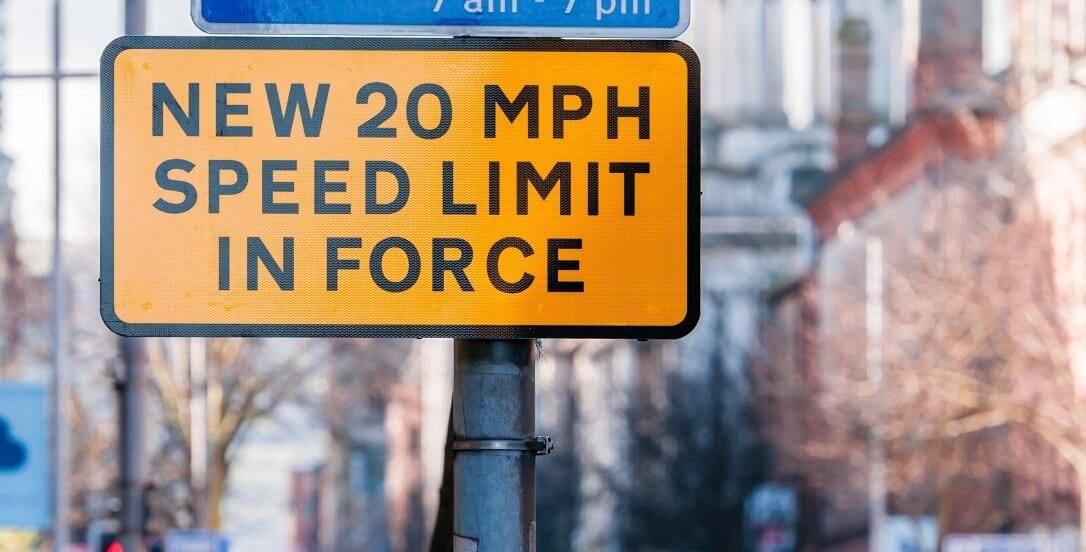What if I told you that you could save hundreds of lives, that you could save yourself millions in costs over years, you could cut down emissions and make the air clearer and healthier for your family and friends, and this would cost you a fraction of the fraction of the money you will see in your lifetime – would you consider that worth it? The Conservatives seemed to think so when they voted in the Senedd to move forward with introducing a default 20mph speed limit for Welsh public roads. Not a surprise given the Welsh Conservative leader Andrew RT Davies was photographed holding a sign saying he supports the introduction of 20mph speed limits alongside a prominent campaigner. The agreement was passed in the Senedd with a staggering 45 votes for and 6 votes against.
There has been quite some uproar surrounding this change though, so let’s take an in-depth look at what exactly this means for us, and why I personally think this is an incredible idea not just for motorists but for the pedestrians and nature surrounding them.
Saving Lives – The Heart of the Matter
Our first and arguably most important point of focus is a matter of life and death – quite literally. The introduction of 20mph limits is not just a change in numbers; it's a life-saving measure. Research unequivocally shows that areas with 20mph limits experience 40% fewer collisions than those with 30mph limits (30-32). But here's where it gets truly compelling: in a 20mph pilot area, accidents involving fatal and serious injuries plummet by a staggering 90% (5-6).
Let's put these statistics into perspective: it's not just about numbers on a spreadsheet; it's about the people behind those figures. This change could potentially save hundreds of lives and prevent thousands of injuries in the decades following its implementation. It's not just about the immeasurable emotional toll of accidents, but also about the substantial reduction in healthcare costs associated with treating injuries and fatalities.
Economic Benefits – Saving Money and Resources
Let's talk numbers, then. The financial aspect of implementing 20mph speed limits is often overlooked but holds immense importance. Firstly, there's the direct economic benefit: lower speed limits mean fewer accidents, resulting in reduced strain on our healthcare system. Treating accident-related injuries and fatalities costs an exorbitant amount of money (5-7), not to mention the emotional toll it takes on families.
By transitioning to 20mph limits, we're not just saving lives; we're also saving a substantial amount of money. Fewer accidents mean fewer hospital admissions, surgeries, and ongoing medical care. It means fewer workdays lost due to injuries, translating to higher productivity for our workforce. It's an investment that pays dividends in terms of both lives and resources.
Environmental Impact – A Breath of Fresh Air
Our commitment to lower speed limits isn't just about us, either; it's about the planet we share. The reduction in speed directly translates to a reduction in particulate emissions. Vehicles operating at 20mph are more fuel-efficient and produce fewer pollutants. It's a small change that can make a big difference.
Research might be limited, but what we know is promising: 20mph limits have been associated with small improvements in air quality. By reducing emissions and encouraging alternatives to driving, we can breathe easier, knowing that we're preserving our environment for future generations.
Promoting Active Travel – Healthier Lifestyles
In a world where physical inactivity is a growing concern, 20mph limits offer a ray of hope. Lower speeds create a safer environment for pedestrians and cyclists, encouraging more people to embrace these active modes of transportation. It's not just about reaching a destination; it's about improving our overall health and well-being.
Cycling enthusiasts, in particular, will benefit from the friendlier road environment. Cycling becomes less intimidating, making it a viable option for commuting, exercise, or simply enjoying the outdoors. As cycling rates increase, we're promoting a healthier, more active way of life while simultaneously reducing congestion and emissions.
A Brighter Future for Our Children
Our children are the future of Wales, and their safety is paramount. 20mph limits encourage more children to walk or cycle to school, fostering independence and a sense of responsibility. The streets become their playground, and the journey to school becomes a cherished part of their day.
The positive impact on schools is immeasurable. Safer streets mean parents feel more comfortable allowing their children to walk or cycle to school, reducing the chaos of drop-offs and pick-ups. It's a win-win situation that benefits both our children and our communities.
The Ripple Effect – Beyond Road Safety
This decision's impact extends far beyond road safety. It touches every aspect of our lives, creating a ripple effect of positive change. Areas with 20mph limits have been shown to experience not just fewer accidents, but also a substantial reduction in noise pollution. Quieter streets mean more peaceful neighbourhoods, improving our overall quality of life. Moreover, slower speeds contribute to a cleaner, healthier Wales. By reducing emissions and encouraging alternatives to driving, we end up with a healthier, happier and more productive society.
In conclusion, this isn't just about rules and regulations; it's about the lives we save, the communities we strengthen, the resources we conserve, and the environment we protect. A 20mph limit isn't merely a speed restriction; it's a promise—a promise of a safer, healthier, and more vibrant Wales for generations to come. It's an investment in our future, one that will yield dividends of safety, health, well-being, and prosperity for all. Isn’t an extra few minutes on your journey worth all of this?


